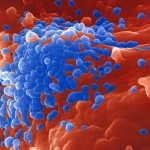Lien vers Pubmed [PMID] – 19042181
Philos. Trans. R. Soc. Lond., B, Biol. Sci. 2009 Mar;364(1517):705-15
The human genome encodes numerous enzymes capable of deaminating polynucleotides. While they are capable of exquisite specificity, occasionally they result in hypermutation where up to 90 per cent of cytidine or adenosine residues may be edited. As such, they constitute a formidable anti-viral barrier, for no virus can survive such a high mutation rate. As the APOBEC3 group of cytidine deaminases edit single-stranded viral DNA, the crucial question is can they hyperedit chromosomal DNA? Everything points to a positive answer. Nonetheless, hypermutants per se have not yet been described, probably being countered by highly efficient mismatch repair. For the APOBEC3 genes, not only is their physiological function unknown, but also their role in the induction of cancer remains to be determined. Yet given the pace of research, all this is certain to change in the next few years.
